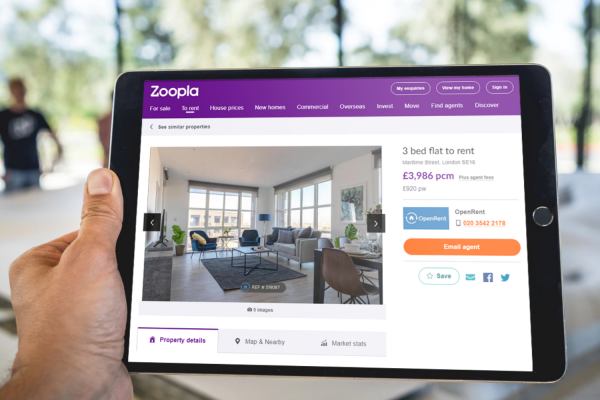If you’re a new landlord, finding tenants can feel like a big task. It’s definitely one of the most important parts of being a landlord, but it doesn’t have to be a stress or take over your life for weeks on end.
This guide for newer (or ‘accidental’) landlords will tell you exactly how to find new tenants for your empty rental property, helping you avoid common mistakes, save money and actually enjoy the whole process of giving a lovely new home to happy tenants you choose yourself.
Let’s jump into it!
Online Agents
The single best way to find tenants in 2020 is through an online letting agent. Virtually all tenants now begin their search for a new home online, using websites like Rightmove and Zoopla, which pull together listings from letting agents across the country in one place.
If you want to advertise on Rightmove and Zoopla, the best way is to use an online letting agent. You can’t create an advert on those sites directly, as they only deal with agents. To get going, read our guide on how to get your property on Rightmove and Zoopla.
Using an online agent to get on these sites (where all the real action happens) is much better than using a high street agent. Online, you can upload your advert from your computer, at home, at any time of day. You can upload your own photos and write your own property description. It’s super-fast and instead of giving up a percentage of your rental income to a high street agent, you just pay one tiny upfront fee.
Use Simple, New Technology to Let Your Property
The benefit of online agents isn’t just property portal website access, however. OpenRent, the UK’s largest agent, has over two million registered tenants and uses smart technology to find you tenants quickly.
For example, as soon as your advert goes live, tenants who have recently been searching for properties like yours will receive an email telling them to check out your listing. If they want a viewing, they can get in touch with you in a few clicks. For tenants, it’s a world away from waiting for agent offices to open so they can call them up and try to arrange a viewing.
Use OpenRent to create your advert in minutes.
Advertise nowNo Need to Use High Street Agents
As a less experienced landlord, you may feel pressure to use a big-name agent with an office on your high street. But there’s really no need. The market has moved on and shunning high street agents will save you thousands of pounds.
The rules and regulations landlords have to comply with can feel scary, but don’t let agents scare you into throwing money at the problem. In reality, letting a property is simple. You don’t need to pay thousands to someone else to do this. In fact, let’s just add it all up for a moment.
An Example of Agent Costs
If you use an agent you can be asked to pay the first month’s rent in one-off fees – that’s around £1,000 based on the average UK rent. Then you’ll be locked in to paying between 5% and 20% of your rental income every month. And if you want to renew? That’s another big one-off fee even if you keep the same tenants.
So if you use an agent, sign a 12-month contract, then renew for another 12 months, then you will have spent over £3,500 by the time you end your tenancy, assuming a rent of £1,000 and a £300 renewal fee.
On OpenRent, that same tenancy would cost just £69. A saving of £3,431 in two years.
Not using a high street agent will save you thousands, give you a direct relationship with your happy new tenants, and cut out a middleman that helps neither you nor your tenant.
Finding Tenants Yourself Is Quick, Easy — and Even Fun!
No wonder, then, that a huge number of landlords are now shunning high street agents and successfully finding tenants themselves by using online agents.
OpenRent advertises nearly 10% of all properties advertised online in the UK. That number is growing fast.
How to Advertise Rental Property Successfully
For landlords letting their property for the first time, there are a lot of common questions on how best to do it. It’s all a lot simpler than it can seem. Here are some of the most asked questions our team face.
Timing your advert to go live
When should you start advertising? When the property is empty? Two months before the tenants are due to move out? This is a common worry. The best time to advertise depends on the speed of the market in your area and whether you plan to let to students.
In general, four to six weeks before the new tenants can move in is a good time to advertise. On the one hand, this ensures you have enough time to find tenants, reference them and sort out the contract and the deposit. On the other, it gives plenty of time for your advert to be found by tenants, while also ensuring tenants who see it are ones who are serious about moving in the next few weeks.
If your property is in a faster market area like London, you can advertise as late as three weeks before the property is available. If you plan to let to students, you’ll need to be on the market whenever students in the area typically arrange their accommodation – this could be months ahead of the property being ready.
Ideally, you will only publish your advert via your online letting agent when it’s fully ready to be viewed. That means it has good photos, a helpful description and the right rental price. It’s important for all these things to be in place as soon as your property goes live. That’s because most eyeballs will be on your property during the first 48 hours of it being live.
Photography and description
High-quality photos are key to a great advert. Like a dating app, tenants swipe through dozens of properties in minutes, and make instant judgements based only on a slither of information – usually the leading photo and the price. Check out our guide on how to take good photos of your property. You can also order professional photography for your rental property with OpenRent.
A good description will show off all the best features of your property and give tenants an idea of what you are looking for in terms of tenancy length and any requirements you have. Be sure to mention the little things you love about your property and begin to turn it into a potential home in the tenant’s mind: gardens, original features, pantries or new furnishings all tick the right boxes for tenants.
If you’re not sure how to write a good description, you can just use OpenRent’s smart description tool. It automatically produces a great description of your property that will be accepted by the property portals, to make sure you go live without any hitches.
When you publish your advert on the portal websites, it will automatically go to the top of the ‘recently posted’ list. It will also be emailed to tenants looking for homes. That means that the majority of tenants who are looking for a property in your area with your number of bedrooms will see your property almost as soon as it is uploaded. If your property goes live with bad photos or without the right information in the description, then it will be too late to change it later – they will have already decided to pass on your property and will have fallen off the website’s front page.
You can also easily add video tours to your property OpenRent listing.
Choosing your rental price
When marketing a property yourself, choosing the price can feel like a tightrope between avoiding a costly void period, where no tenant is in your property paying rent, and selling yourself short. Some landlords like to put their property on the market at a high price, then reduce it slightly every week until it is let.
We’d advise against that for the reasons given above: most tenants will only see your advert once, on the day it goes live. That means it’s crucial to enter the market with the right price.
One way to find the market rate is to search OpenRent for similar properties in your area, and see how they are priced, then mark yours up or down a tad if it is higher or lower spec than average.
But the best way to price your property is using our Rent Calculator. We use millions of data-points from across the UK rental market to give you the best price for your property. Just enter your property details now and it will use science to do the rest!
Widen your tenant pool
OpenRent and other sites allow tenants to search for properties based on criteria like ‘student friendly’ or ‘pet friendly’. While you might have an ideal tenant in mind before you advertise your property, it’s important not to reduce the pool of tenants you are advertising to without very good reason.
Some properties are simply not suitable for, e.g. dog owners, but landlords can often miss out on great tenants by not giving these restrictive criteria much thought. OpenRent always recommends setting your advert as available to the widest pool of tenants possible, and considering every application on its own merits – not ruling people out based on imprecise criteria.
Furnishing
In some local markets, offering a furnished property is the norm. In others, unfurnished is the default. Make sure you research this before you decide how to let your property. High-quality furniture and white goods can earn you a higher rent, but they also face greater depreciation and will be more costly to repair and replace if required.
It’s also possible to offer properties as furnished at the tenant’s request. If you do have nice, new furnishings, be sure to mention this in your property description. It can help your advert stand out.
Show off your features
Make sure your property’s best selling points feature highly in your photos and description. Make sure you give them a big plug at your viewings, too! Tenants like to fall in love with properties and establish a quick psychological connection with their would-be new home. Help them out with beautiful images of your lovely fireplace, mosaic hallway or thriving garden.
Once Your Advert is Live
Once your advert is live, tenants will begin to enquire about viewing the property. It’s important to have a good system to organise tenant interest and make sure you only progress with serious and committed tenants. Here’s how.
Vetting questions
It’s not unusual for OpenRent landlords to receive dozens of enquiries from interested tenants. You can’t reasonably give a viewing to all these tenants, so you need a way to select the best enquiries to proceed with.
The easiest way to do this is to ask tenants to answer some pre-viewing questions. Some landlords call this ‘vetting’. The idea is that instead of asking tenants routine questions at the viewing only to find out they aren’t suitable for the let, you ask them upfront to save both parties the wasted time of going to a viewing.
These questions might include:
- When are you looking to move in?
- How many people will move into the property?
- What is your relation to any co-tenants?
- The rent is £xxx. How will you pay the rent? (i.e. employed income, self-employed income, savings, benefits, someone else will pay, etc.)
- What is your annual income?
- Can you provide a guarantor if required?
- Can you provide past landlord and employer references if required?
If you know these questions are deal breakers to you, ask them up front! OpenRent lets you automatically send a message with your pre-viewing questions to all tenants who enquire, saving you a lot of time.
Here’s our guide on how to vet tenants with pre-viewing questions.
Good signs to look out for
While you can never fully predict what a tenant will be like once they move into a property, there are some signs that suggest you will enjoy a happy relationship with your tenant.
Tenants who are good at communicating and have an understanding of what your concerns are as a landlord are likely to make good tenants. For example, tenants who include a lot of information about themselves in their initial enquiries, or tell you early on if they are looking to rent with a pet, or that they are unlikely to pass referencing but do have a guarantor.
Viewings
Using OpenRent to find tenants means you’ll be able to meet your tenants before they move in. This usually happens at the viewing. This is what tenants love most about OpenRent – being able to have a direct connection with the landlord and avoid any middleman letting agents.
The viewing is a good time to speak to the tenants and learn more about them, helping you to ultimately make a decision about whether you want to let to them. Tenants will be appreciative if you anticipate their most common questions, such as about bills, which furnishings will come with the property, and when you’d like them to move it.
If possible, it’s always good to politely ask the existing tenants if they could ensure the property is presentable.
Don’t rush
If your property is getting a decent level of interest, then there’s no need to feel pressure to rush or accept tenants you are not sure about. If you follow the timing suggested above, you’ll have plenty of time to wait for the right tenants.
In fast market areas like London, tenants may have many good options and you might be worried to lose out on a tenant who is trying to lock things in quickly. For example, if a tenant wants to place a holding deposit, but you’d like them to answer more of your vetting questions first, then stick to your guns. Doing so will save you feeling rushed into a tenancy. As we’ll explain below, it’s key not to rush through tenant referencing.
Referencing tenants once you find them
Tenant referencing is the best tool landlords have available to learn more about their tenants in a reliable way. Any guarantors a tenant proposes can also be referenced. As long as the tenants (or their guarantors) pass referencing, you can then access Rent Guarantee Insurance, which lowers the risk of the tenancy by covering your rental income.
Referencing includes a credit check, fraud information, an employer and previous landlord reference, and whether the tenant has any CCJs or other court information. It only take 3-5 working days on average, but can be much faster depending on how fast the tenant works with the referencing company.
Right to Rent Checks
Keep in mind that in England, any tenants will need to be able to pass a Right to Rent check before you can let to them. This involves the tenant providing documents which prove they have the right to rent in the UK.
You can see a full guide of which documents are acceptable and how to perform these checks here at our Right to Rent guide. Make sure you check the tenant’s right to rent before signing a contract!
Negotiating
Tenants may make an offer to let your property for less than your advertised rent. They may ask for some repairs to be made before they move in or for permission to bring a pet with them. If you are not happy with this, then you can simply refuse, but it is usually best to be a little flexible and try and meet promising potential tenants in the middle. Ultimately, who you let to is your choice, so if you think you can find a tenant who is happy to pay the advertised rent, then you can refuse the tenant’s demands and keep looking for other tenants.
Anything that is agreed should be agreed in writing by both parties. If the tenant has already placed the holding deposit, then any changes to the terms of the let would require your permission and tenants pulling out may forfeit their holding deposit.
What next?
Once you have found a tenant you’d like to let to, you have a new landlord ‘to do’ list. Top of the list are creating and signing a contract, collecting the deposit and the first month’s rent. But you’ll also need to cover your legal duties, like serving the ‘How to Rent’ booklet and protecting the deposit in an approved scheme.
OpenRent can handle all of this for you with Rent Now, the best tenancy setup service out there. It does everything landlords need; so you can go from finding tenants to enjoying a happy, legally sound tenancy in no time.
Learn more about how Rent Now takes care of all your landlord concerns here.



